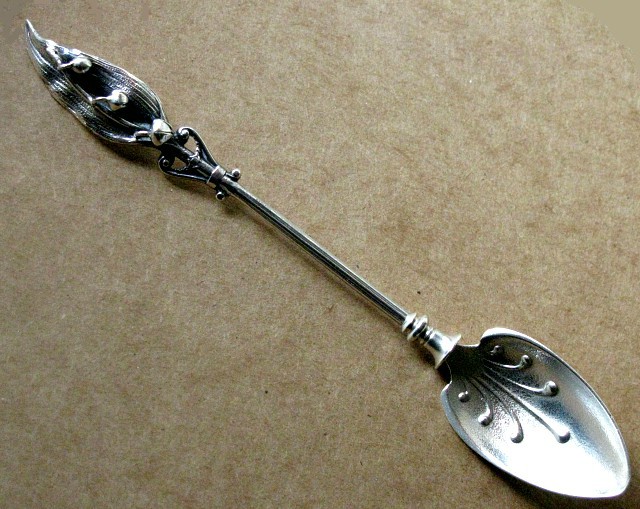Can't tell you the name of your pattern, but it's very similar in design to a circa 1890 Gorham pattern called 'Violet', and believe yours would date about the same, and was also most likely named for the flower depicted - have only seen 'Violet' in pattern guide illustrations, so no idea whether it was die-struck or cast, yours does look like it might be cast, but some die-struck patterns can be quite intricate and deeply detailed. Honestly can't tell enough from the pictures whether your spoon is cast or die-struck, but typically a cast piece will be thick, having, for lack of a better term, a sort of 'softer' look and feel - handling a lot of silver can give one a feel and an eye for how it's made. Gorham's cast flatware pieces usually had die-struck working ends (there were exceptions like fancy bon-bon type spoon bowls, smaller pieces, etc.), often decorated to complement the handle, and chasing, engraving and/or piercing was common - doubt this had much to do with cost, but would guess more to do with strength, since striking and hammering hardens the metal.
Illustration of the 'Violet' pattern (note the similar blunt cut-off of the pattern at the bowl):

Gorham used two methods for their cast pieces, sand casting and lost-wax - a design like this would have most likely been sand cast, while a fully three-dimensional design like Birds Nest would have been produced using the lost-wax technique. Have never seen any or even heard of the Birds Nest pattern being die-struck, and frankly, it just couldn't have been produced in that manner - however, in the 1880s Gorham did produce a die-struck 'Hammered Antique' pattern that had added cast elements of silver, bronze or copper, and there was a bird's nest among the numerous motifs. There were several Gorham cast, or with cast components, flatware patterns - the desirable 'Narragansett' pattern and associated designs were cast, with added applied cast elements, so every piece was slightly different, and they also produced a good number of one-piece cast souvenir spoons in the early-mid 1890s, as well as using cast handles, finials and elements on other souvenir spoons. The 'H' series were pieces of Gorham flatware that weren't associated with a named pattern, the 'H' prefix was used on widely varied pieces, including cast designs, from 1898 to around 1907, though also on some pieces a bit beyond then, and if the pieces were earlier numbered designs, the 'H' was added to those numbers.
As an example of different components that might be used in production, this is an 1860s-70s coffee spoon in a Lily of the Valley pattern that was made in just a few different type pieces - the leaf finial with curlicue decoration is cast, with the attached tiny blossoms formed of sheet silver on wire, the stem of the spoon is a solid fluted rod, with another cast piece, including a rat-tail, soldered to a die-struck bowl:

~Cheryl















